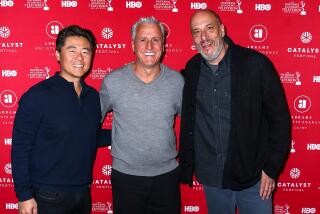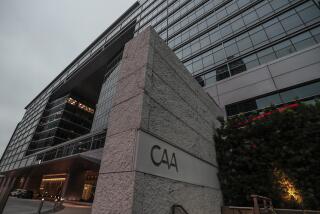In MPAA statement, Hollywood studios show support for Sony after attack
Weeks after hackers waged a devastating cyberassault on Sony Pictures Entertainment, major Hollywood studios have broken their silence on the worst hack attack in the industry’s history.
The Motion Picture Assn. of America, the chief lobbying arm for U.S. film studios, expressed support for Sony as it tries to recover from the hack. Until this week, Sony’s rivals in Hollywood had been conspicuously silent on the leaks and resisted making public statements.
“Sony Pictures is not just a valued member of our association family, but they are friends and colleagues and we feel for them,” the MPAA said. “We continue to be in constant touch with their leadership and will be of any assistance to them that we can.”
The statement comes as studios and their lobbyists face mounting pressure to respond to the extraordinary hack that caused the release of sensitive data starting Nov. 24.
Hackers released data that included thousands of pages of emails from studio chiefs, salaries of top executives and Social Security numbers of thousands of employees. Some of Sony’s movies, including the family musical “Annie,” were also uploaded to the Internet.
MPAA Chairman Chris Dodd and Sony Pictures Chairman Michael Lynton worked for a week to craft a letter of solidarity from Sony’s peers. Their efforts were initially rebuffed, several people familiar with the matter said.
Until this week, studio executives could not agree on what to say, complicating matters for the MPAA, which makes decisions based on consensus. Reflecting the ambivalence, Monday’s statement was not signed by the top studio executives who oversee the group.
“There were a variety of concerns that people had,” said one person familiar with the confidential discussions between the studios. “Everybody is united in terms of what’s happening and feeling awful about what’s happened.”
Nonetheless, the person said, some studio executives wondered whether a statement would accomplish anything or merely “put themselves in the line of fire.”
Representatives of Paramount, Universal, Warner Bros., 20th Century Fox and Sony studios declined to comment. A representative for Disney did not respond to a request for comment.
A spokeswoman for the MPAA declined to comment beyond the statement and said Dodd, a former U.S. senator from Connecticut, was unavailable for an interview.
Marc Wanamaker, a Los Angeles-based film historian, said the studios’ initial reluctance to publicly show their support for Sony is not surprising.
“I think under normal circumstances they would back each other, but this is something of the unknown,” he said.
“They don’t know how to protect themselves yet — that is the reason they are not saying anything,” Wanamaker added. “If they were all secure and everything is fine, they would come to their aid. But they are not secure.... They are scared to death something like this might happen to them.”
The reluctance of the studios to speak publicly on the Sony hack was first reported Sunday by the New York Times.
Yet studios have been outspoken in the past on how much online piracy is damaging their business as more entertainment flows on the Internet.
Combating online piracy of movies and television shows has been a priority for studios and the MPAA, which has sponsored studies on the damaging effects of piracy and has advocated for tougher enforcement of copyright laws.
The MPAA led a controversial effort to back federal anti-piracy legislation, known as SOPA and PIPA. But the campaign was derailed nearly three years ago by fierce opposition from Google Inc. and other tech giants and activists who viewed the bills as an unwarranted intrusion on Internet freedom.
Although that legislative effort fizzled, recently leaked documents show lawyers from MPAA and major studios discussing a strategy of working with state attorneys general on campaigns to fight Internet piracy and counter the influence of “Goliath,” an apparent reference to Google.
“As a trade association, our primary objective is to protect our members and their creative works — employing voluntary initiatives, policy solutions and legal actions,” MPAA spokeswoman Kate Bedingfield said. “When wrongdoing is taking place online, we work with and support appropriate law enforcement officials, including the attorneys general, as do many other industries.”
A spokesman for Google declined to comment.
The attack on Sony has also put rival studios on notice to shore up their own systems. Major film companies have spent the last few weeks examining their security, and employees ranging from studio chiefs to junior-level executives have been warned to be more careful about what they put in emails.
The leaked Sony emails sparked a feeding frenzy in the media, providing a rare glimpse into the workings of a major studio along with some embarrassing emails. In one series of emails, studio co-Chairman Amy Pascal joked with producer Scott Rudin over whether President Obama prefers black-themed movies. Pascal and Rudin both apologized.
A group calling itself Guardians of Peace has claimed responsibility for the attack, demanding that Sony cancel the release of “The Interview,” a comedy depicting a fictional assassination attempt on North Korean leader Kim Jung Un.
Contributing to this report were Times staff writers Saba Hamedy, Daniel Miller, Ryan Faughnder and Amy Kaufman.
More to Read
From the Oscars to the Emmys.
Get the Envelope newsletter for exclusive awards season coverage, behind-the-scenes stories from the Envelope podcast and columnist Glenn Whipp’s must-read analysis.
You may occasionally receive promotional content from the Los Angeles Times.







